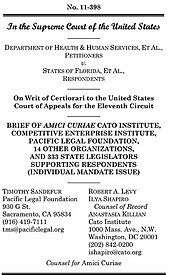Learn more about Cato’s Amicus Briefs Program.
With the scheduled three days of oral argument six weeks away, Cato filed its fourth and final Supreme Court amicus brief in the Obamacare saga, this time on the most critical issue: the constitutionality of the individual mandate. Cato, alongside Pacific Legal Foundation, Competitive Enterprise Institute, 14 other organizations, and a bipartisan group of 333 state legislators, urges the Court to affirm the Eleventh Circuit’s ruling that the mandate exceeds Congress’s power to regulate interstate commerce. Under modern doctrine, regulating intrastate economic activity can be a “necessary” means of carrying out Congress’s regulatory authority (as that term is understood under the Necessary and Proper Clause) if, in the aggregate, it has a substantial effect on interstate commerce. But the obvious corollary is that regulating non-economic activity cannot be “necessary,” regardless of its economic effects. And a power to regulate inactivity—to compel activity—is even more remote from Congress’s commerce power. The government characterizes not being insured as the activity of making an “economic decision” of how to finance health care services, but the notion that probable future participation in the marketplace constitutes economic activity now pushes far beyond existing precedent. Further, that definition of “activity” leaves people with no way of avoiding federal regulation; at any moment, we are all not engaged in an infinite set of activities. Retaining the categorical distinction between economic and non-economic activity limits Congress to regulating intrastate activities closely connected to interstate commerce—thus preserving the proper role of states and preventing Congress from using the Commerce Clause as a federal police power. The categorical distinction also provides a judicially administrable standard that obviates fact-based inquiries into the purported economic effects and the relative necessity of any one regulation, an exercise for which courts are ill-suited. Finally, the mandate violates the “proper” prong of the Necessary and Proper Clause in that it unconstitutionally commandeers the people—and in doing so, circumvents the Constitution’s preference for political accountability. The Constitution permits Congress to intrude on state and popular sovereignty only in certain limited circumstances: when doing so is textually based or when it relates to the duties of citizenship. For example, Congress may require people to respond to the census or serve on juries. In forcing people to engage in transactions with private companies, the individual mandate allows Congress and the president to evade being held accountable for what would otherwise be a tax increase. In improperly commandeering citizens to engage in economic activity, the mandate obscures Obamacare’s true costs and thus avoids the political accountability and transparent budgeting that the Constitution demands. Thus, the mandate is neither a necessary nor proper means for carrying into execution Congress’s power to regulate interstate commerce. Upholding it would fundamentally alter the relationship of the federal government to the states and the people; nobody would ever again be able to claim plausibly that the Constitution limits federal power.

This work is licensed under a Creative Commons Attribution-NonCommercial-ShareAlike 4.0 International License.
